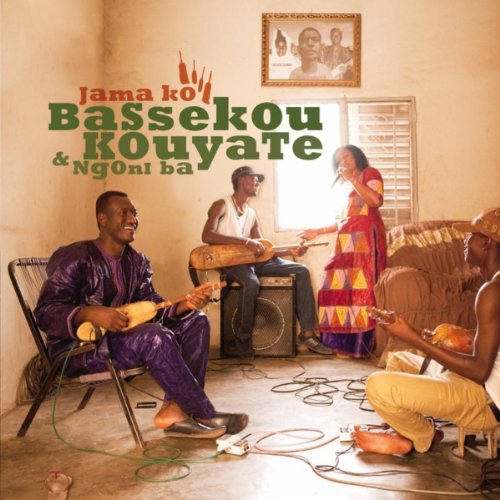
Bassekou Kouyate & Ngoni Ba
Jama Ko
Release Date: Apr 2, 2013
Genre(s): International
Record label: Out Here Records
Music Critic Score
How the Music Critic Score works
Buy Jama Ko from Amazon
Album Review: Jama Ko by Bassekou Kouyate & Ngoni Ba
Excellent, Based on 6 Critics
Based on rating 9/10
Malian musician Bassekou Kouyaté has an unquestionable pedigree when it comes to African blues. An expert ngoni player, he's performed alongside such luminaries as Toumani Diabaté and Taj Mahal (the latter featured here on penultimate track "Poye 2"), as well as being one of the key musicians on Ali Farka Toure's posthumously released Savane. Jama ko (meaning "a big gathering of people") is the follow-up to I Speak Fula, his excellent (and Grammy-nominated) album for Sub Pop in 2009, and it's every bit as good as its predecessor.
Based on rating 4/5
Few records could have been produced in more challenging circumstances than this third LP by the Malian Ngoni maestro. Begun on the day rebel troops staged a coup just half a mile away from the studio in downtown Bamako, the recording was subject to power cuts and daily curfews. Worse, with the formerly peaceful country plunged into crisis and hardline Islamist groups in the north posing the threat of a nationwide ban on music, the very future of Malian song was plunged into doubt.
Based on rating 4/5
Defiant, angry new music from Mali, by the world's greatest exponent of the ngoni, the ancient West African lute. There are four different ngonis in Bassekou Kouyate's band, and two of them are now played by his sons Moustafa and Mamadou, while his wife, Amy Sacko, adds powerful vocals with help from the great Kasse Mady Diabaté and others. But it's Bassekou who dominates, with a new, tougher, amplified ngoni style that shows the influence of co-producer Howard Bilerman, who has also worked with Arcade Fire.
Based on rating 3.5/5
Jama Ko is the third album by Malian ngoni master Bassekou Kouyaté and his “ngoni band”. It is as it sounds: an African album, written and performed by African people, and thus one that may appear ripe for interpretation by those of us who prefer our music Western (or, at the very least, haven’t been exposed to divergent pathways). For many of us, this will be the type of album that comes packaged with a few perfunctory Wikpedia searches--where is Mali, again? What's that Tuareg-Islamist war all about? Is this "highlife" or "Afrobeat" or what? I’m not attacking this method of understanding, necessarily; the further a culture is or seems to be from our own, the more context we might need to understand how a piece of art from that culture fits into its creative environment.
Opinion: Excellent
Laura Mvula SING TO THE MOON. The songs on Laura Mvula’s debut album, “Sing to the Moon” (Columbia), hail from some alternate pop universe: a realm of choirs and orchestras, of dense harmonies and of songs that unfurl their own forms rather than follow verse-chorus-verse formulas. Ms. Mvula ….
Opinion: Excellent
One of Mali’s most popular artists continues to impress on the global stage. Martin Longley 2013 In a very short time, Bassekou Kouyate has established himself as one of Mali’s most popular artists, both in the recording studio and on the live stage. Kouyate also rejoices in an unusual band formation, which includes four players of the n’goni, manifested in its differing tonal sizes.
'Jama Ko'
is available now

